Developing Personal and Management Skills Report - HRM4001, Semester 1
VerifiedAdded on 2022/12/22
|13
|3701
|36
Report
AI Summary
This report, submitted by a student, delves into the crucial realm of personal and management skills development. The assignment explores key concepts, including the importance of effective management and leadership in achieving organizational goals. It utilizes models such as Gibbs' reflective model and Kolb's experiential learning theory to analyze and reflect on these skills. The report also presents a personal development plan designed to enhance management and leadership capabilities. Furthermore, it investigates transferable skills and their application within an organization, specifically examining supportive communication and motivation strategies within the context of John Lewis Partnership. The report includes analysis of various communication models and their relevance to practical application. The report also outlines a personal development plan to enhance management and leadership skills.
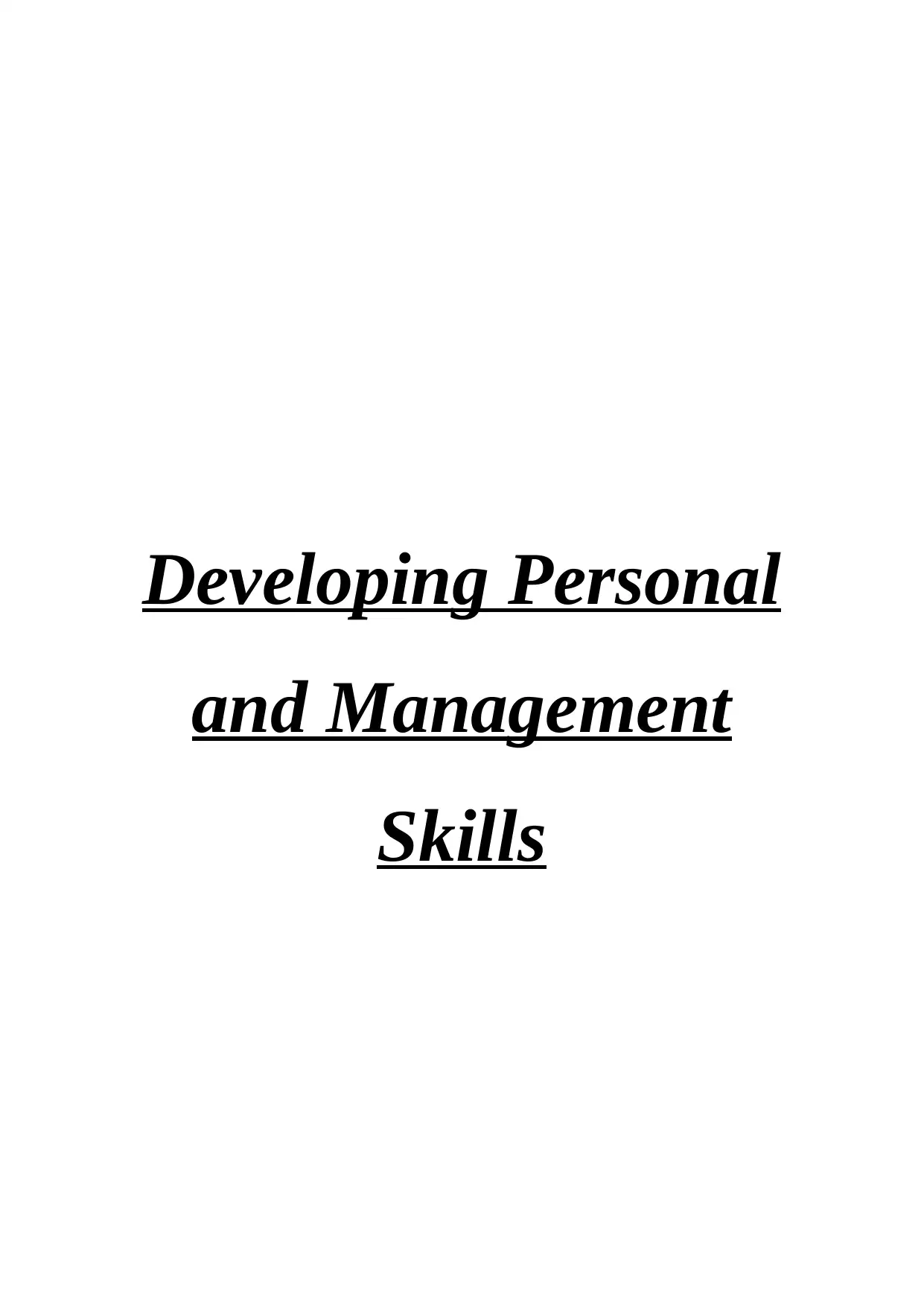
Developing Personal
and Management
Skills
and Management
Skills
Paraphrase This Document
Need a fresh take? Get an instant paraphrase of this document with our AI Paraphraser
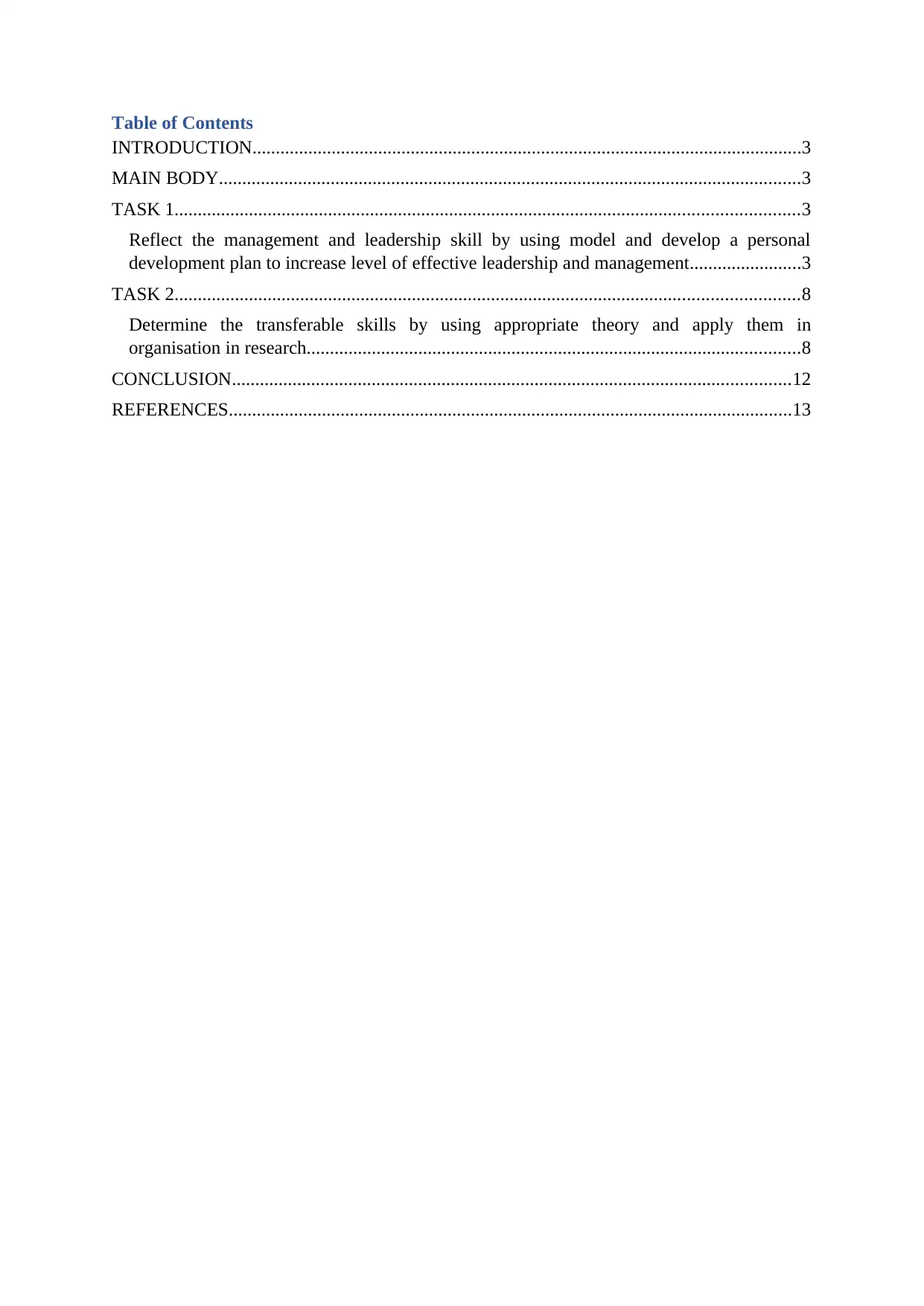
Table of Contents
INTRODUCTION......................................................................................................................3
MAIN BODY.............................................................................................................................3
TASK 1......................................................................................................................................3
Reflect the management and leadership skill by using model and develop a personal
development plan to increase level of effective leadership and management........................3
TASK 2......................................................................................................................................8
Determine the transferable skills by using appropriate theory and apply them in
organisation in research..........................................................................................................8
CONCLUSION........................................................................................................................12
REFERENCES.........................................................................................................................13
INTRODUCTION......................................................................................................................3
MAIN BODY.............................................................................................................................3
TASK 1......................................................................................................................................3
Reflect the management and leadership skill by using model and develop a personal
development plan to increase level of effective leadership and management........................3
TASK 2......................................................................................................................................8
Determine the transferable skills by using appropriate theory and apply them in
organisation in research..........................................................................................................8
CONCLUSION........................................................................................................................12
REFERENCES.........................................................................................................................13
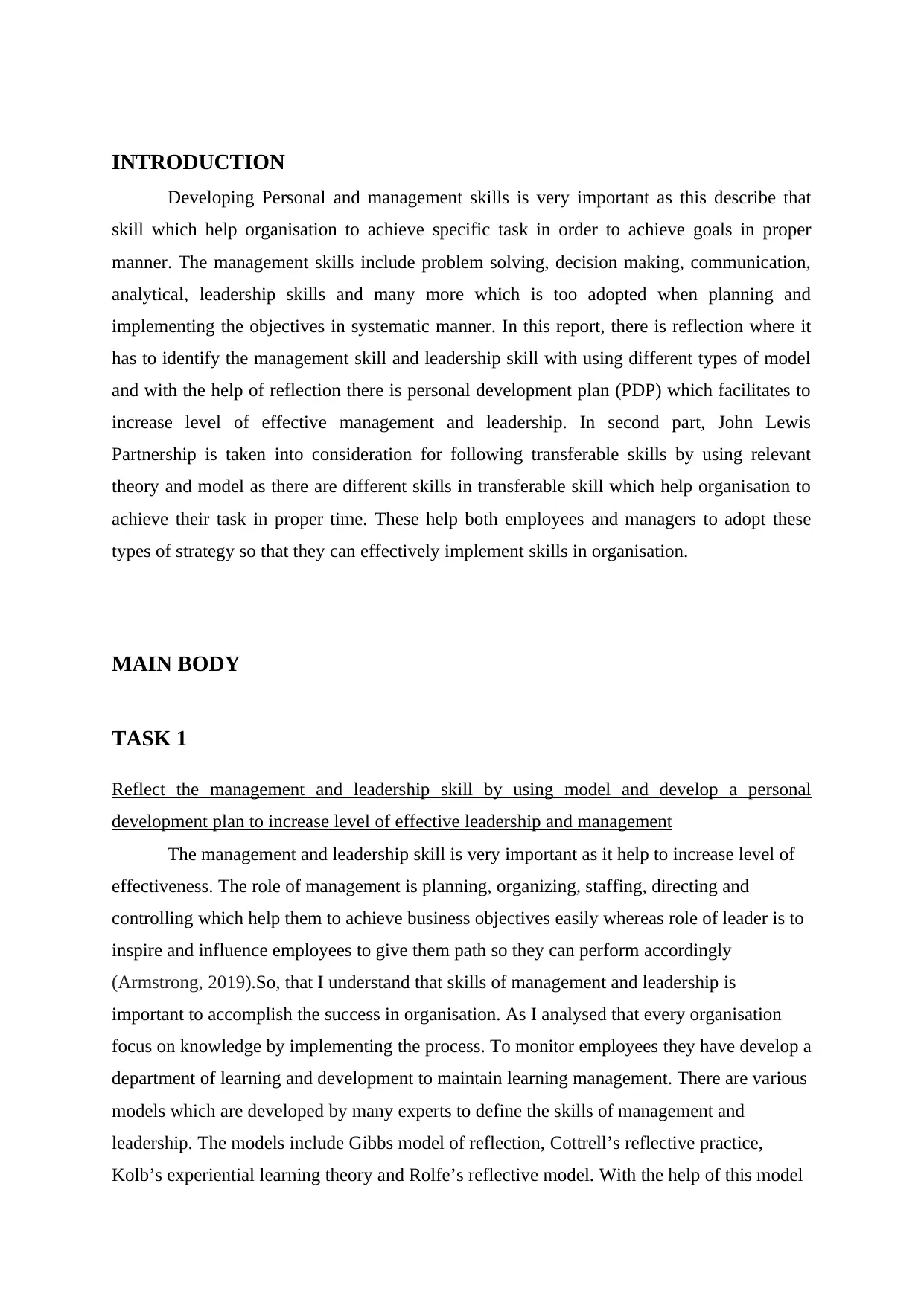
INTRODUCTION
Developing Personal and management skills is very important as this describe that
skill which help organisation to achieve specific task in order to achieve goals in proper
manner. The management skills include problem solving, decision making, communication,
analytical, leadership skills and many more which is too adopted when planning and
implementing the objectives in systematic manner. In this report, there is reflection where it
has to identify the management skill and leadership skill with using different types of model
and with the help of reflection there is personal development plan (PDP) which facilitates to
increase level of effective management and leadership. In second part, John Lewis
Partnership is taken into consideration for following transferable skills by using relevant
theory and model as there are different skills in transferable skill which help organisation to
achieve their task in proper time. These help both employees and managers to adopt these
types of strategy so that they can effectively implement skills in organisation.
MAIN BODY
TASK 1
Reflect the management and leadership skill by using model and develop a personal
development plan to increase level of effective leadership and management
The management and leadership skill is very important as it help to increase level of
effectiveness. The role of management is planning, organizing, staffing, directing and
controlling which help them to achieve business objectives easily whereas role of leader is to
inspire and influence employees to give them path so they can perform accordingly
(Armstrong, 2019).So, that I understand that skills of management and leadership is
important to accomplish the success in organisation. As I analysed that every organisation
focus on knowledge by implementing the process. To monitor employees they have develop a
department of learning and development to maintain learning management. There are various
models which are developed by many experts to define the skills of management and
leadership. The models include Gibbs model of reflection, Cottrell’s reflective practice,
Kolb’s experiential learning theory and Rolfe’s reflective model. With the help of this model
Developing Personal and management skills is very important as this describe that
skill which help organisation to achieve specific task in order to achieve goals in proper
manner. The management skills include problem solving, decision making, communication,
analytical, leadership skills and many more which is too adopted when planning and
implementing the objectives in systematic manner. In this report, there is reflection where it
has to identify the management skill and leadership skill with using different types of model
and with the help of reflection there is personal development plan (PDP) which facilitates to
increase level of effective management and leadership. In second part, John Lewis
Partnership is taken into consideration for following transferable skills by using relevant
theory and model as there are different skills in transferable skill which help organisation to
achieve their task in proper time. These help both employees and managers to adopt these
types of strategy so that they can effectively implement skills in organisation.
MAIN BODY
TASK 1
Reflect the management and leadership skill by using model and develop a personal
development plan to increase level of effective leadership and management
The management and leadership skill is very important as it help to increase level of
effectiveness. The role of management is planning, organizing, staffing, directing and
controlling which help them to achieve business objectives easily whereas role of leader is to
inspire and influence employees to give them path so they can perform accordingly
(Armstrong, 2019).So, that I understand that skills of management and leadership is
important to accomplish the success in organisation. As I analysed that every organisation
focus on knowledge by implementing the process. To monitor employees they have develop a
department of learning and development to maintain learning management. There are various
models which are developed by many experts to define the skills of management and
leadership. The models include Gibbs model of reflection, Cottrell’s reflective practice,
Kolb’s experiential learning theory and Rolfe’s reflective model. With the help of this model
⊘ This is a preview!⊘
Do you want full access?
Subscribe today to unlock all pages.

Trusted by 1+ million students worldwide
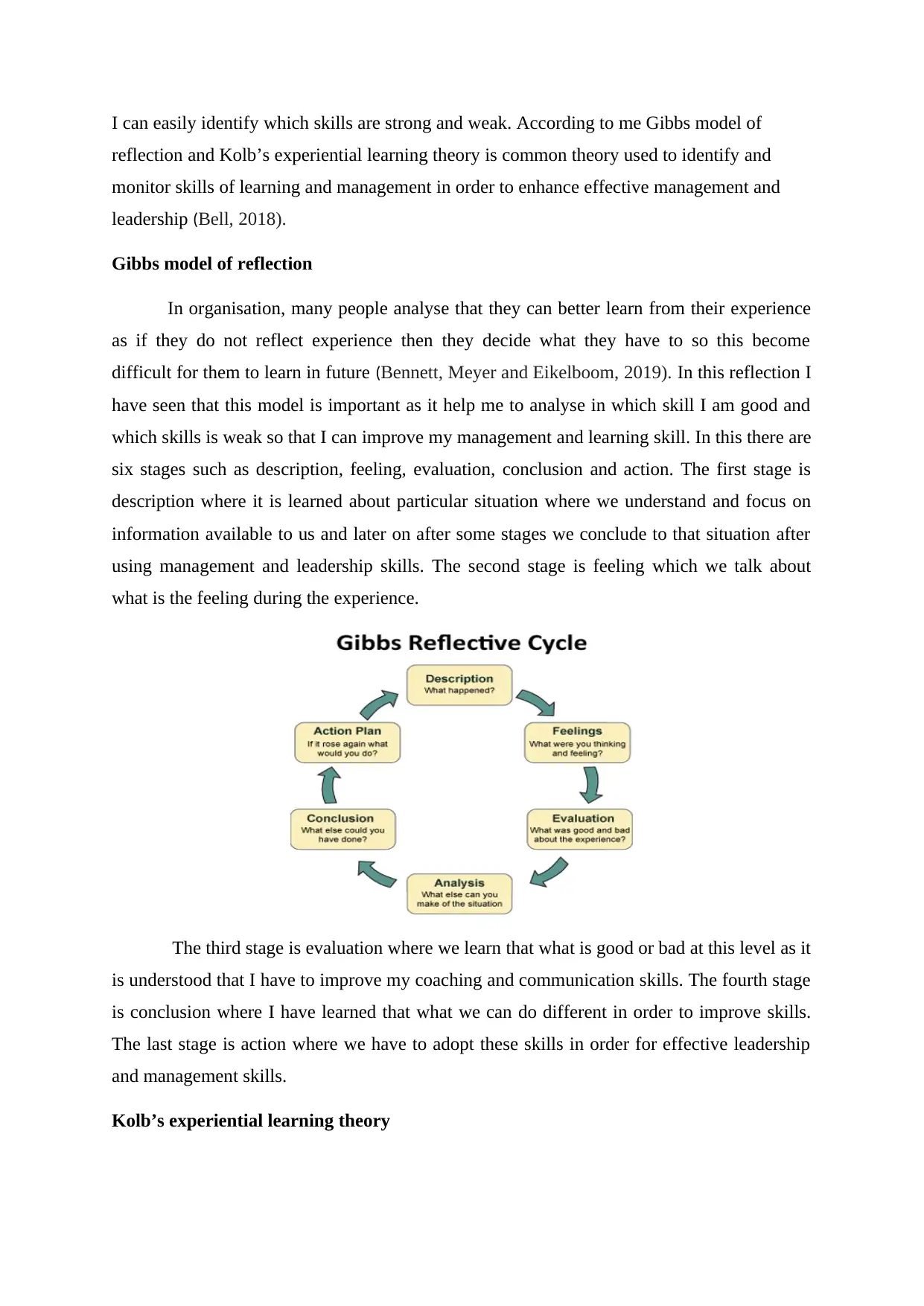
I can easily identify which skills are strong and weak. According to me Gibbs model of
reflection and Kolb’s experiential learning theory is common theory used to identify and
monitor skills of learning and management in order to enhance effective management and
leadership (Bell, 2018).
Gibbs model of reflection
In organisation, many people analyse that they can better learn from their experience
as if they do not reflect experience then they decide what they have to so this become
difficult for them to learn in future (Bennett, Meyer and Eikelboom, 2019). In this reflection I
have seen that this model is important as it help me to analyse in which skill I am good and
which skills is weak so that I can improve my management and learning skill. In this there are
six stages such as description, feeling, evaluation, conclusion and action. The first stage is
description where it is learned about particular situation where we understand and focus on
information available to us and later on after some stages we conclude to that situation after
using management and leadership skills. The second stage is feeling which we talk about
what is the feeling during the experience.
The third stage is evaluation where we learn that what is good or bad at this level as it
is understood that I have to improve my coaching and communication skills. The fourth stage
is conclusion where I have learned that what we can do different in order to improve skills.
The last stage is action where we have to adopt these skills in order for effective leadership
and management skills.
Kolb’s experiential learning theory
reflection and Kolb’s experiential learning theory is common theory used to identify and
monitor skills of learning and management in order to enhance effective management and
leadership (Bell, 2018).
Gibbs model of reflection
In organisation, many people analyse that they can better learn from their experience
as if they do not reflect experience then they decide what they have to so this become
difficult for them to learn in future (Bennett, Meyer and Eikelboom, 2019). In this reflection I
have seen that this model is important as it help me to analyse in which skill I am good and
which skills is weak so that I can improve my management and learning skill. In this there are
six stages such as description, feeling, evaluation, conclusion and action. The first stage is
description where it is learned about particular situation where we understand and focus on
information available to us and later on after some stages we conclude to that situation after
using management and leadership skills. The second stage is feeling which we talk about
what is the feeling during the experience.
The third stage is evaluation where we learn that what is good or bad at this level as it
is understood that I have to improve my coaching and communication skills. The fourth stage
is conclusion where I have learned that what we can do different in order to improve skills.
The last stage is action where we have to adopt these skills in order for effective leadership
and management skills.
Kolb’s experiential learning theory
Paraphrase This Document
Need a fresh take? Get an instant paraphrase of this document with our AI Paraphraser
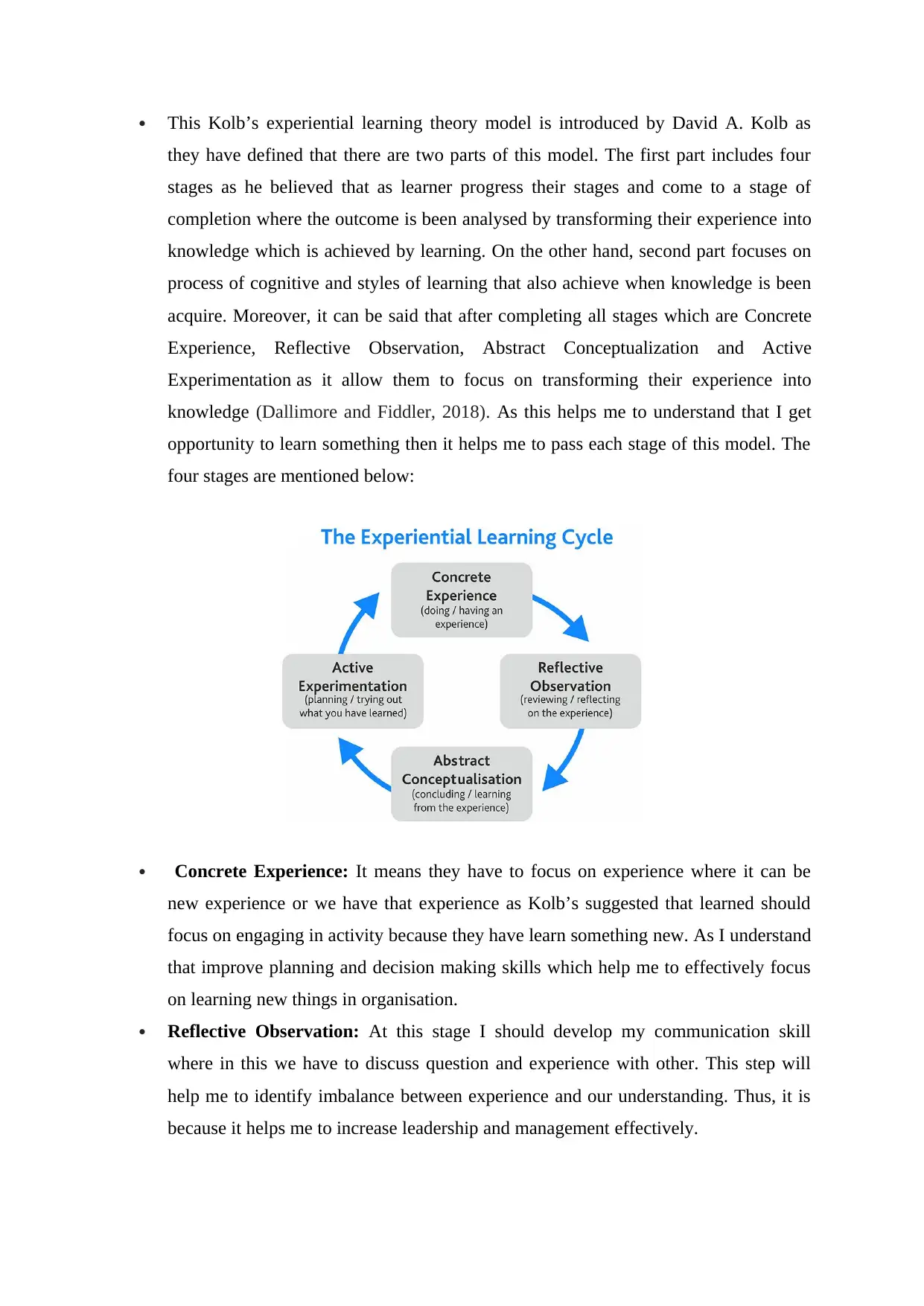
This Kolb’s experiential learning theory model is introduced by David A. Kolb as
they have defined that there are two parts of this model. The first part includes four
stages as he believed that as learner progress their stages and come to a stage of
completion where the outcome is been analysed by transforming their experience into
knowledge which is achieved by learning. On the other hand, second part focuses on
process of cognitive and styles of learning that also achieve when knowledge is been
acquire. Moreover, it can be said that after completing all stages which are Concrete
Experience, Reflective Observation, Abstract Conceptualization and Active
Experimentation as it allow them to focus on transforming their experience into
knowledge (Dallimore and Fiddler, 2018). As this helps me to understand that I get
opportunity to learn something then it helps me to pass each stage of this model. The
four stages are mentioned below:
Concrete Experience: It means they have to focus on experience where it can be
new experience or we have that experience as Kolb’s suggested that learned should
focus on engaging in activity because they have learn something new. As I understand
that improve planning and decision making skills which help me to effectively focus
on learning new things in organisation.
Reflective Observation: At this stage I should develop my communication skill
where in this we have to discuss question and experience with other. This step will
help me to identify imbalance between experience and our understanding. Thus, it is
because it helps me to increase leadership and management effectively.
they have defined that there are two parts of this model. The first part includes four
stages as he believed that as learner progress their stages and come to a stage of
completion where the outcome is been analysed by transforming their experience into
knowledge which is achieved by learning. On the other hand, second part focuses on
process of cognitive and styles of learning that also achieve when knowledge is been
acquire. Moreover, it can be said that after completing all stages which are Concrete
Experience, Reflective Observation, Abstract Conceptualization and Active
Experimentation as it allow them to focus on transforming their experience into
knowledge (Dallimore and Fiddler, 2018). As this helps me to understand that I get
opportunity to learn something then it helps me to pass each stage of this model. The
four stages are mentioned below:
Concrete Experience: It means they have to focus on experience where it can be
new experience or we have that experience as Kolb’s suggested that learned should
focus on engaging in activity because they have learn something new. As I understand
that improve planning and decision making skills which help me to effectively focus
on learning new things in organisation.
Reflective Observation: At this stage I should develop my communication skill
where in this we have to discuss question and experience with other. This step will
help me to identify imbalance between experience and our understanding. Thus, it is
because it helps me to increase leadership and management effectively.
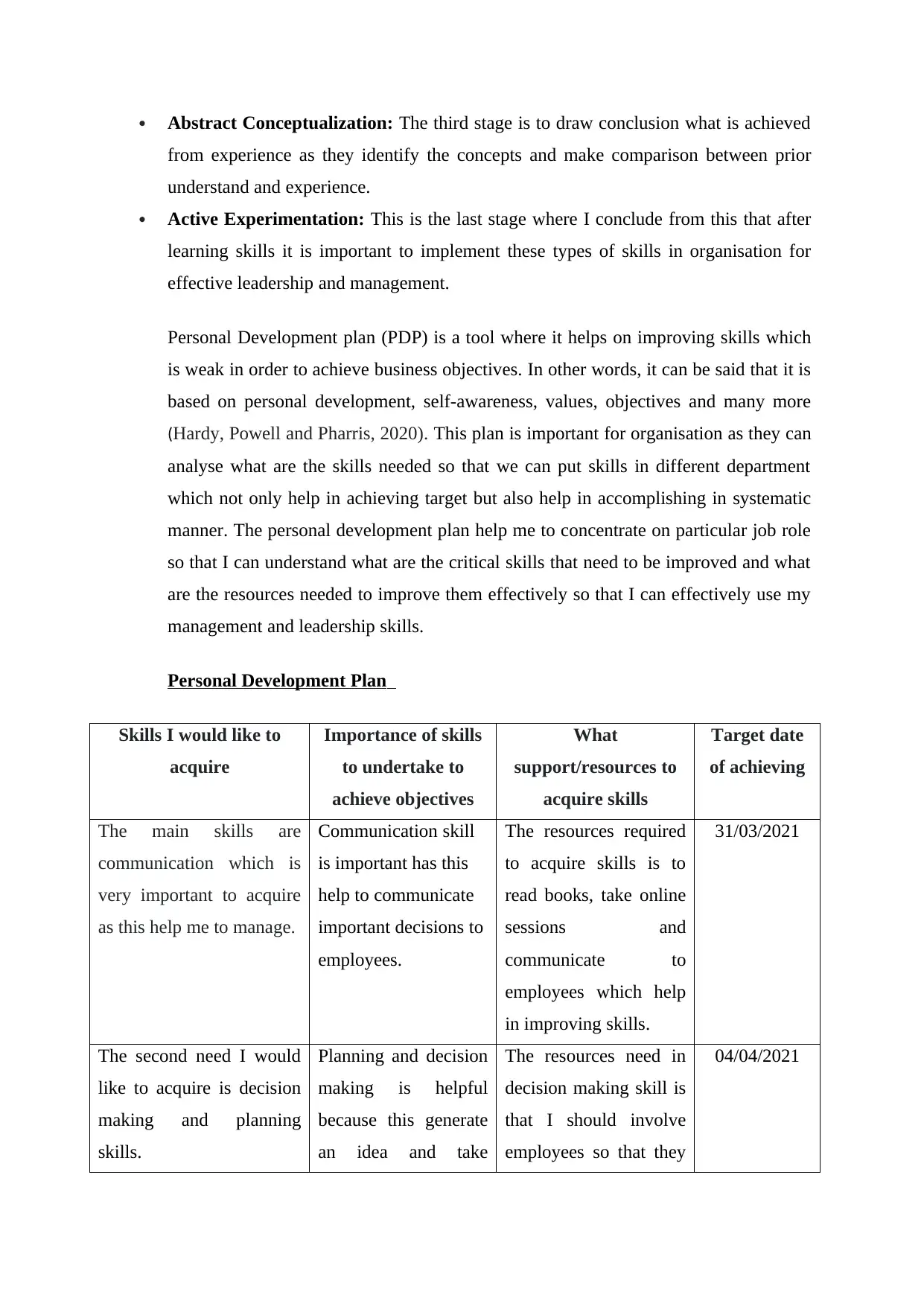
Abstract Conceptualization: The third stage is to draw conclusion what is achieved
from experience as they identify the concepts and make comparison between prior
understand and experience.
Active Experimentation: This is the last stage where I conclude from this that after
learning skills it is important to implement these types of skills in organisation for
effective leadership and management.
Personal Development plan (PDP) is a tool where it helps on improving skills which
is weak in order to achieve business objectives. In other words, it can be said that it is
based on personal development, self-awareness, values, objectives and many more
(Hardy, Powell and Pharris, 2020). This plan is important for organisation as they can
analyse what are the skills needed so that we can put skills in different department
which not only help in achieving target but also help in accomplishing in systematic
manner. The personal development plan help me to concentrate on particular job role
so that I can understand what are the critical skills that need to be improved and what
are the resources needed to improve them effectively so that I can effectively use my
management and leadership skills.
Personal Development Plan
Skills I would like to
acquire
Importance of skills
to undertake to
achieve objectives
What
support/resources to
acquire skills
Target date
of achieving
The main skills are
communication which is
very important to acquire
as this help me to manage.
Communication skill
is important has this
help to communicate
important decisions to
employees.
The resources required
to acquire skills is to
read books, take online
sessions and
communicate to
employees which help
in improving skills.
31/03/2021
The second need I would
like to acquire is decision
making and planning
skills.
Planning and decision
making is helpful
because this generate
an idea and take
The resources need in
decision making skill is
that I should involve
employees so that they
04/04/2021
from experience as they identify the concepts and make comparison between prior
understand and experience.
Active Experimentation: This is the last stage where I conclude from this that after
learning skills it is important to implement these types of skills in organisation for
effective leadership and management.
Personal Development plan (PDP) is a tool where it helps on improving skills which
is weak in order to achieve business objectives. In other words, it can be said that it is
based on personal development, self-awareness, values, objectives and many more
(Hardy, Powell and Pharris, 2020). This plan is important for organisation as they can
analyse what are the skills needed so that we can put skills in different department
which not only help in achieving target but also help in accomplishing in systematic
manner. The personal development plan help me to concentrate on particular job role
so that I can understand what are the critical skills that need to be improved and what
are the resources needed to improve them effectively so that I can effectively use my
management and leadership skills.
Personal Development Plan
Skills I would like to
acquire
Importance of skills
to undertake to
achieve objectives
What
support/resources to
acquire skills
Target date
of achieving
The main skills are
communication which is
very important to acquire
as this help me to manage.
Communication skill
is important has this
help to communicate
important decisions to
employees.
The resources required
to acquire skills is to
read books, take online
sessions and
communicate to
employees which help
in improving skills.
31/03/2021
The second need I would
like to acquire is decision
making and planning
skills.
Planning and decision
making is helpful
because this generate
an idea and take
The resources need in
decision making skill is
that I should involve
employees so that they
04/04/2021
⊘ This is a preview!⊘
Do you want full access?
Subscribe today to unlock all pages.

Trusted by 1+ million students worldwide
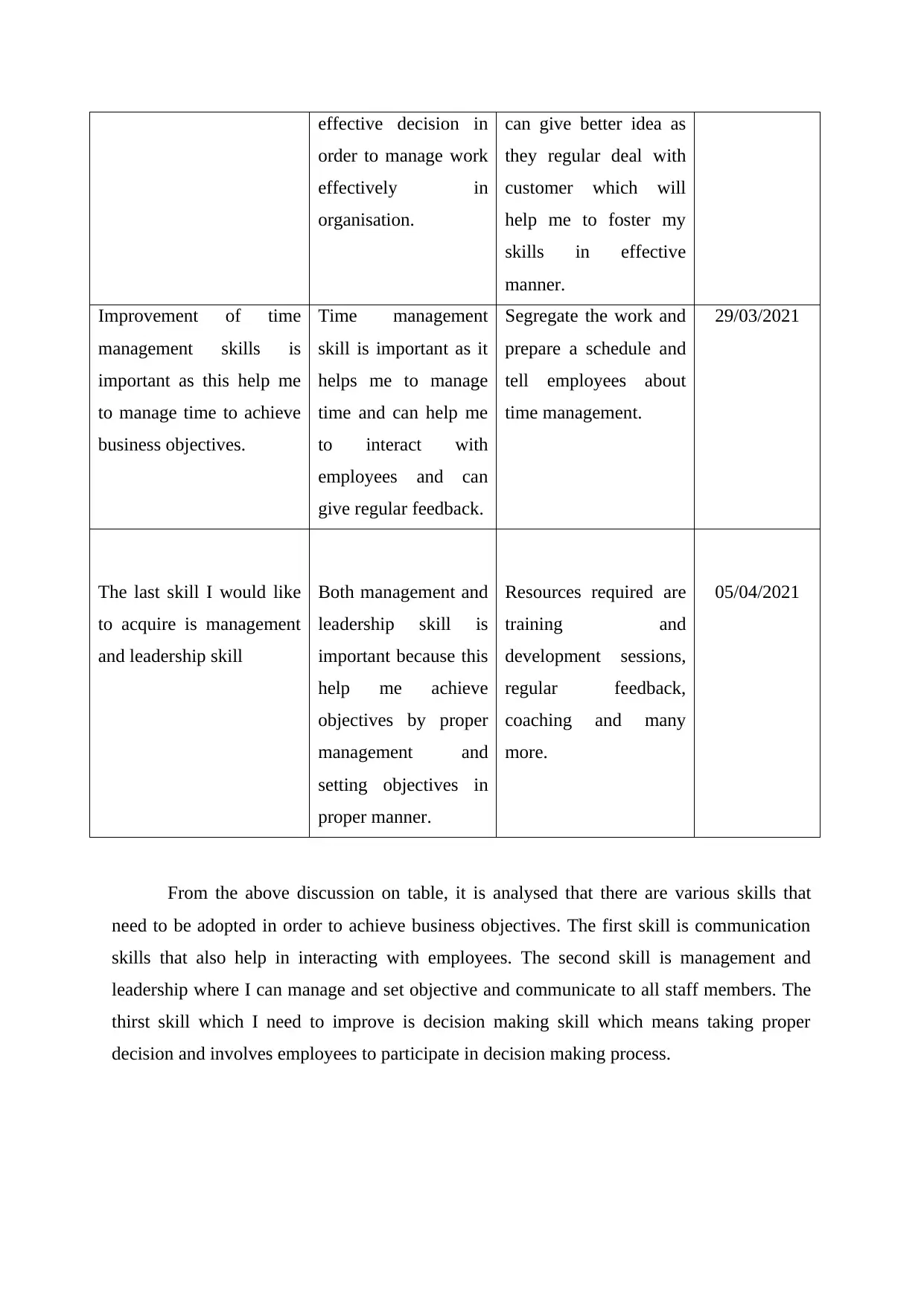
effective decision in
order to manage work
effectively in
organisation.
can give better idea as
they regular deal with
customer which will
help me to foster my
skills in effective
manner.
Improvement of time
management skills is
important as this help me
to manage time to achieve
business objectives.
Time management
skill is important as it
helps me to manage
time and can help me
to interact with
employees and can
give regular feedback.
Segregate the work and
prepare a schedule and
tell employees about
time management.
29/03/2021
The last skill I would like
to acquire is management
and leadership skill
Both management and
leadership skill is
important because this
help me achieve
objectives by proper
management and
setting objectives in
proper manner.
Resources required are
training and
development sessions,
regular feedback,
coaching and many
more.
05/04/2021
From the above discussion on table, it is analysed that there are various skills that
need to be adopted in order to achieve business objectives. The first skill is communication
skills that also help in interacting with employees. The second skill is management and
leadership where I can manage and set objective and communicate to all staff members. The
thirst skill which I need to improve is decision making skill which means taking proper
decision and involves employees to participate in decision making process.
order to manage work
effectively in
organisation.
can give better idea as
they regular deal with
customer which will
help me to foster my
skills in effective
manner.
Improvement of time
management skills is
important as this help me
to manage time to achieve
business objectives.
Time management
skill is important as it
helps me to manage
time and can help me
to interact with
employees and can
give regular feedback.
Segregate the work and
prepare a schedule and
tell employees about
time management.
29/03/2021
The last skill I would like
to acquire is management
and leadership skill
Both management and
leadership skill is
important because this
help me achieve
objectives by proper
management and
setting objectives in
proper manner.
Resources required are
training and
development sessions,
regular feedback,
coaching and many
more.
05/04/2021
From the above discussion on table, it is analysed that there are various skills that
need to be adopted in order to achieve business objectives. The first skill is communication
skills that also help in interacting with employees. The second skill is management and
leadership where I can manage and set objective and communicate to all staff members. The
thirst skill which I need to improve is decision making skill which means taking proper
decision and involves employees to participate in decision making process.
Paraphrase This Document
Need a fresh take? Get an instant paraphrase of this document with our AI Paraphraser
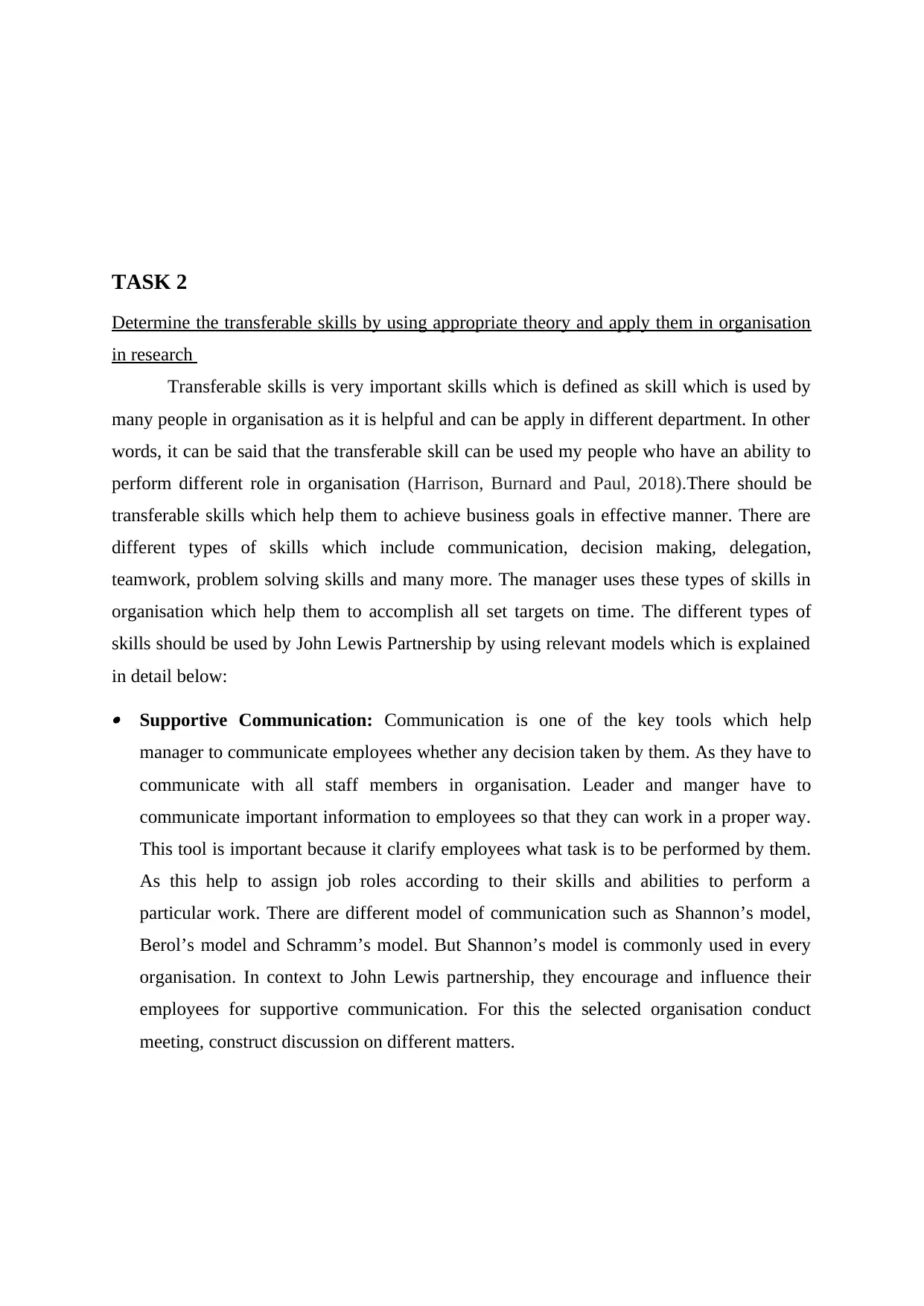
TASK 2
Determine the transferable skills by using appropriate theory and apply them in organisation
in research
Transferable skills is very important skills which is defined as skill which is used by
many people in organisation as it is helpful and can be apply in different department. In other
words, it can be said that the transferable skill can be used my people who have an ability to
perform different role in organisation (Harrison, Burnard and Paul, 2018).There should be
transferable skills which help them to achieve business goals in effective manner. There are
different types of skills which include communication, decision making, delegation,
teamwork, problem solving skills and many more. The manager uses these types of skills in
organisation which help them to accomplish all set targets on time. The different types of
skills should be used by John Lewis Partnership by using relevant models which is explained
in detail below:
Supportive Communication: Communication is one of the key tools which help
manager to communicate employees whether any decision taken by them. As they have to
communicate with all staff members in organisation. Leader and manger have to
communicate important information to employees so that they can work in a proper way.
This tool is important because it clarify employees what task is to be performed by them.
As this help to assign job roles according to their skills and abilities to perform a
particular work. There are different model of communication such as Shannon’s model,
Berol’s model and Schramm’s model. But Shannon’s model is commonly used in every
organisation. In context to John Lewis partnership, they encourage and influence their
employees for supportive communication. For this the selected organisation conduct
meeting, construct discussion on different matters.
Determine the transferable skills by using appropriate theory and apply them in organisation
in research
Transferable skills is very important skills which is defined as skill which is used by
many people in organisation as it is helpful and can be apply in different department. In other
words, it can be said that the transferable skill can be used my people who have an ability to
perform different role in organisation (Harrison, Burnard and Paul, 2018).There should be
transferable skills which help them to achieve business goals in effective manner. There are
different types of skills which include communication, decision making, delegation,
teamwork, problem solving skills and many more. The manager uses these types of skills in
organisation which help them to accomplish all set targets on time. The different types of
skills should be used by John Lewis Partnership by using relevant models which is explained
in detail below:
Supportive Communication: Communication is one of the key tools which help
manager to communicate employees whether any decision taken by them. As they have to
communicate with all staff members in organisation. Leader and manger have to
communicate important information to employees so that they can work in a proper way.
This tool is important because it clarify employees what task is to be performed by them.
As this help to assign job roles according to their skills and abilities to perform a
particular work. There are different model of communication such as Shannon’s model,
Berol’s model and Schramm’s model. But Shannon’s model is commonly used in every
organisation. In context to John Lewis partnership, they encourage and influence their
employees for supportive communication. For this the selected organisation conduct
meeting, construct discussion on different matters.
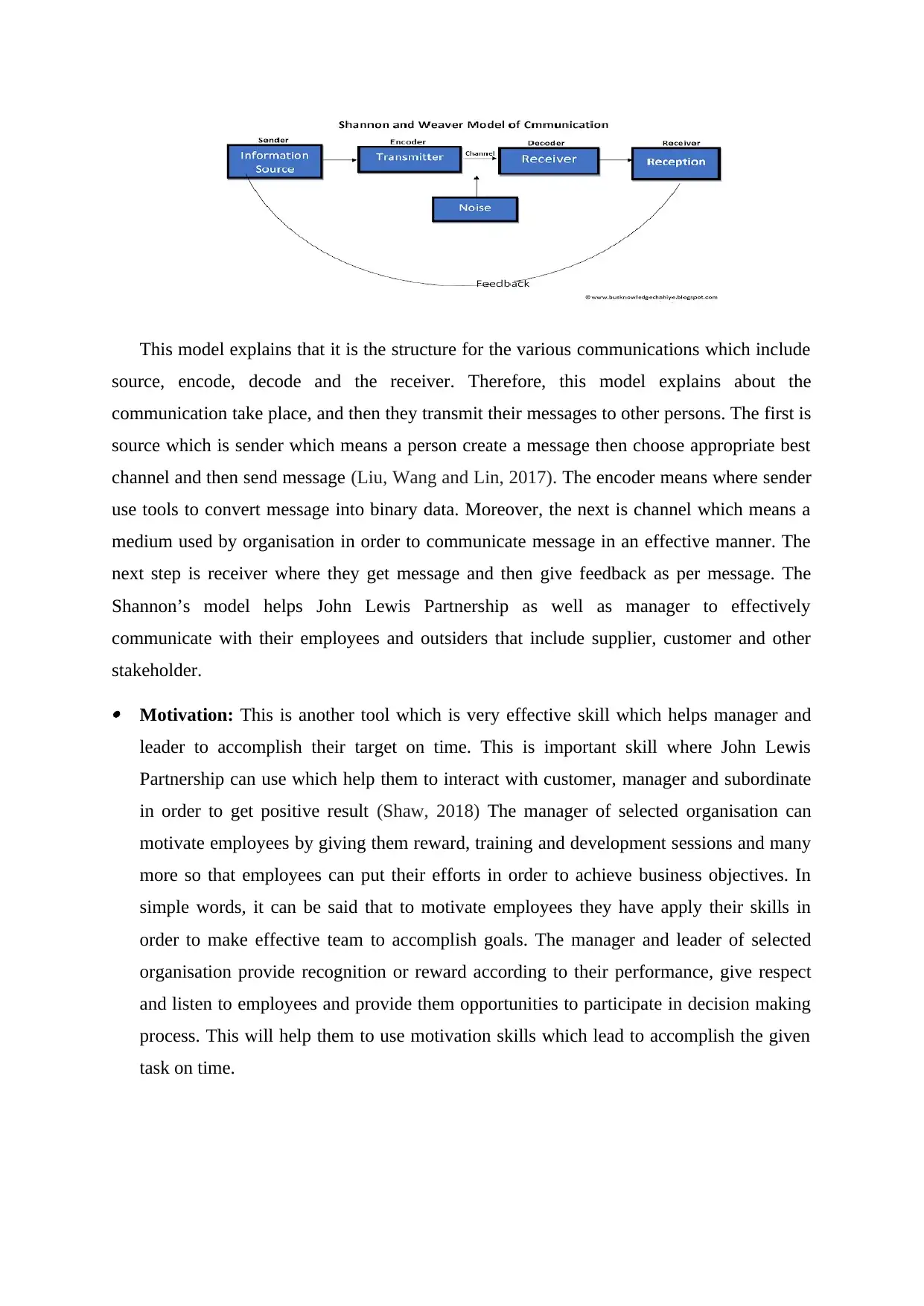
This model explains that it is the structure for the various communications which include
source, encode, decode and the receiver. Therefore, this model explains about the
communication take place, and then they transmit their messages to other persons. The first is
source which is sender which means a person create a message then choose appropriate best
channel and then send message (Liu, Wang and Lin, 2017). The encoder means where sender
use tools to convert message into binary data. Moreover, the next is channel which means a
medium used by organisation in order to communicate message in an effective manner. The
next step is receiver where they get message and then give feedback as per message. The
Shannon’s model helps John Lewis Partnership as well as manager to effectively
communicate with their employees and outsiders that include supplier, customer and other
stakeholder.
Motivation: This is another tool which is very effective skill which helps manager and
leader to accomplish their target on time. This is important skill where John Lewis
Partnership can use which help them to interact with customer, manager and subordinate
in order to get positive result (Shaw, 2018) The manager of selected organisation can
motivate employees by giving them reward, training and development sessions and many
more so that employees can put their efforts in order to achieve business objectives. In
simple words, it can be said that to motivate employees they have apply their skills in
order to make effective team to accomplish goals. The manager and leader of selected
organisation provide recognition or reward according to their performance, give respect
and listen to employees and provide them opportunities to participate in decision making
process. This will help them to use motivation skills which lead to accomplish the given
task on time.
source, encode, decode and the receiver. Therefore, this model explains about the
communication take place, and then they transmit their messages to other persons. The first is
source which is sender which means a person create a message then choose appropriate best
channel and then send message (Liu, Wang and Lin, 2017). The encoder means where sender
use tools to convert message into binary data. Moreover, the next is channel which means a
medium used by organisation in order to communicate message in an effective manner. The
next step is receiver where they get message and then give feedback as per message. The
Shannon’s model helps John Lewis Partnership as well as manager to effectively
communicate with their employees and outsiders that include supplier, customer and other
stakeholder.
Motivation: This is another tool which is very effective skill which helps manager and
leader to accomplish their target on time. This is important skill where John Lewis
Partnership can use which help them to interact with customer, manager and subordinate
in order to get positive result (Shaw, 2018) The manager of selected organisation can
motivate employees by giving them reward, training and development sessions and many
more so that employees can put their efforts in order to achieve business objectives. In
simple words, it can be said that to motivate employees they have apply their skills in
order to make effective team to accomplish goals. The manager and leader of selected
organisation provide recognition or reward according to their performance, give respect
and listen to employees and provide them opportunities to participate in decision making
process. This will help them to use motivation skills which lead to accomplish the given
task on time.
⊘ This is a preview!⊘
Do you want full access?
Subscribe today to unlock all pages.

Trusted by 1+ million students worldwide
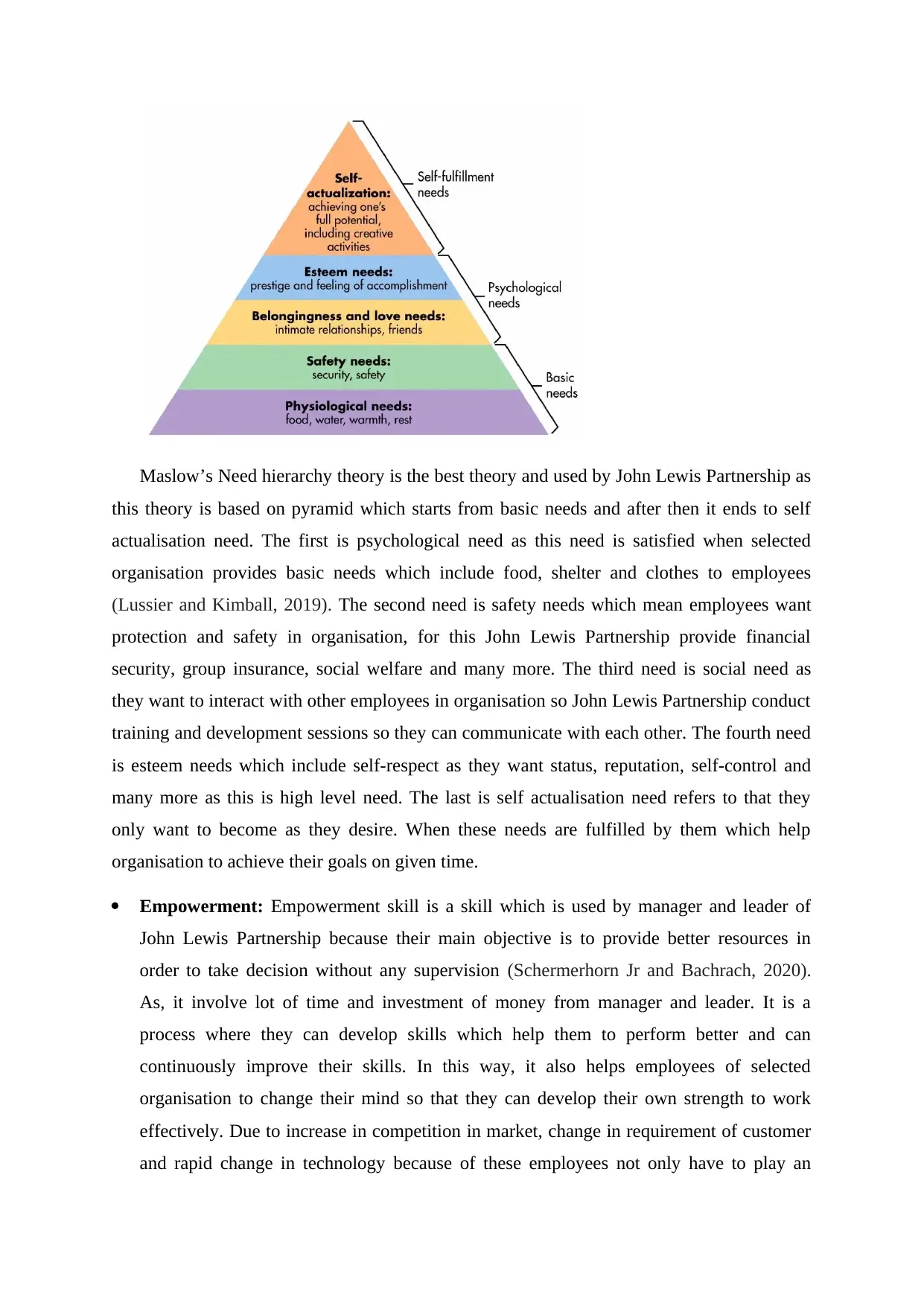
Maslow’s Need hierarchy theory is the best theory and used by John Lewis Partnership as
this theory is based on pyramid which starts from basic needs and after then it ends to self
actualisation need. The first is psychological need as this need is satisfied when selected
organisation provides basic needs which include food, shelter and clothes to employees
(Lussier and Kimball, 2019). The second need is safety needs which mean employees want
protection and safety in organisation, for this John Lewis Partnership provide financial
security, group insurance, social welfare and many more. The third need is social need as
they want to interact with other employees in organisation so John Lewis Partnership conduct
training and development sessions so they can communicate with each other. The fourth need
is esteem needs which include self-respect as they want status, reputation, self-control and
many more as this is high level need. The last is self actualisation need refers to that they
only want to become as they desire. When these needs are fulfilled by them which help
organisation to achieve their goals on given time.
Empowerment: Empowerment skill is a skill which is used by manager and leader of
John Lewis Partnership because their main objective is to provide better resources in
order to take decision without any supervision (Schermerhorn Jr and Bachrach, 2020).
As, it involve lot of time and investment of money from manager and leader. It is a
process where they can develop skills which help them to perform better and can
continuously improve their skills. In this way, it also helps employees of selected
organisation to change their mind so that they can develop their own strength to work
effectively. Due to increase in competition in market, change in requirement of customer
and rapid change in technology because of these employees not only have to play an
this theory is based on pyramid which starts from basic needs and after then it ends to self
actualisation need. The first is psychological need as this need is satisfied when selected
organisation provides basic needs which include food, shelter and clothes to employees
(Lussier and Kimball, 2019). The second need is safety needs which mean employees want
protection and safety in organisation, for this John Lewis Partnership provide financial
security, group insurance, social welfare and many more. The third need is social need as
they want to interact with other employees in organisation so John Lewis Partnership conduct
training and development sessions so they can communicate with each other. The fourth need
is esteem needs which include self-respect as they want status, reputation, self-control and
many more as this is high level need. The last is self actualisation need refers to that they
only want to become as they desire. When these needs are fulfilled by them which help
organisation to achieve their goals on given time.
Empowerment: Empowerment skill is a skill which is used by manager and leader of
John Lewis Partnership because their main objective is to provide better resources in
order to take decision without any supervision (Schermerhorn Jr and Bachrach, 2020).
As, it involve lot of time and investment of money from manager and leader. It is a
process where they can develop skills which help them to perform better and can
continuously improve their skills. In this way, it also helps employees of selected
organisation to change their mind so that they can develop their own strength to work
effectively. Due to increase in competition in market, change in requirement of customer
and rapid change in technology because of these employees not only have to play an
Paraphrase This Document
Need a fresh take? Get an instant paraphrase of this document with our AI Paraphraser
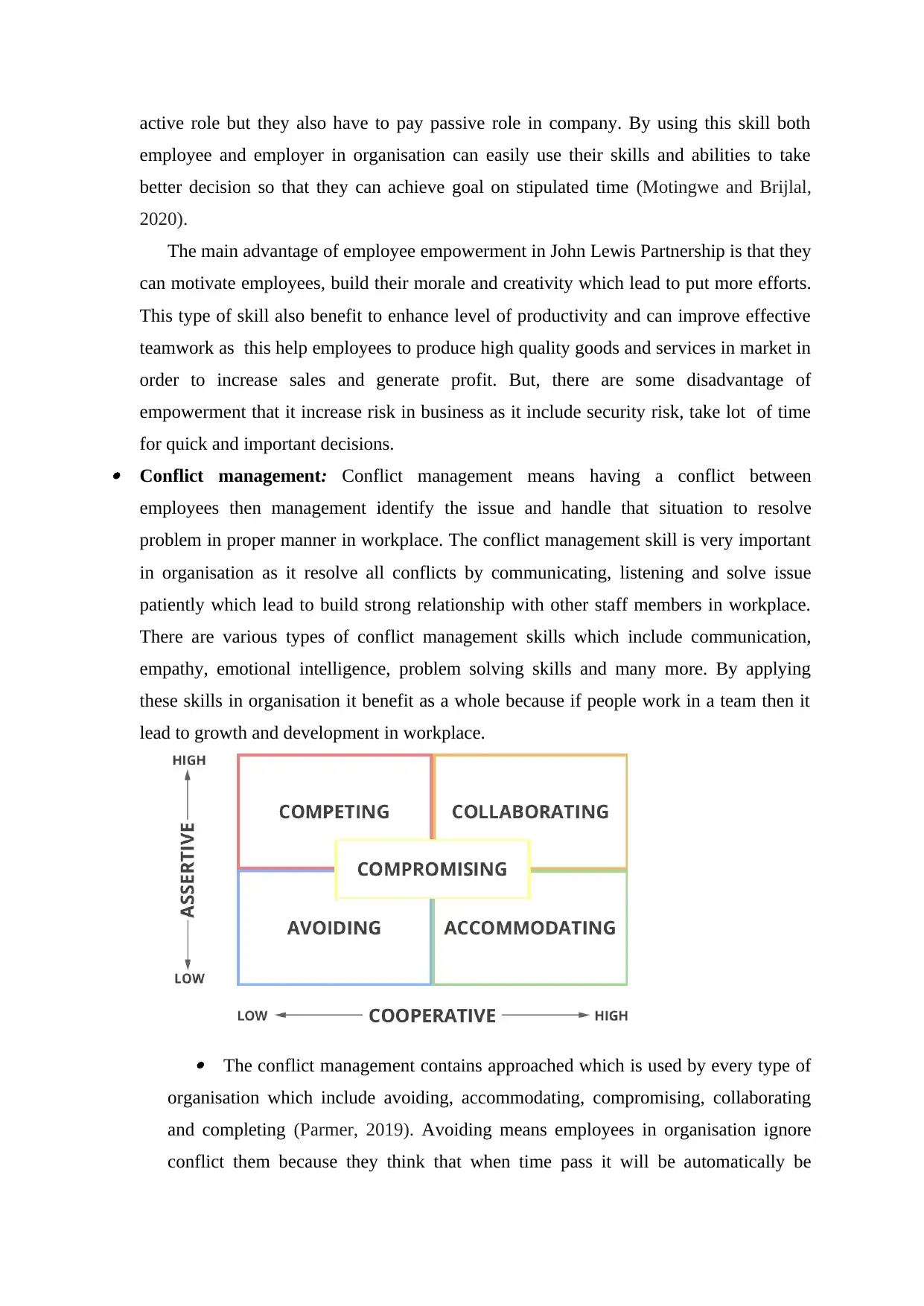
active role but they also have to pay passive role in company. By using this skill both
employee and employer in organisation can easily use their skills and abilities to take
better decision so that they can achieve goal on stipulated time (Motingwe and Brijlal,
2020).
The main advantage of employee empowerment in John Lewis Partnership is that they
can motivate employees, build their morale and creativity which lead to put more efforts.
This type of skill also benefit to enhance level of productivity and can improve effective
teamwork as this help employees to produce high quality goods and services in market in
order to increase sales and generate profit. But, there are some disadvantage of
empowerment that it increase risk in business as it include security risk, take lot of time
for quick and important decisions. Conflict management: Conflict management means having a conflict between
employees then management identify the issue and handle that situation to resolve
problem in proper manner in workplace. The conflict management skill is very important
in organisation as it resolve all conflicts by communicating, listening and solve issue
patiently which lead to build strong relationship with other staff members in workplace.
There are various types of conflict management skills which include communication,
empathy, emotional intelligence, problem solving skills and many more. By applying
these skills in organisation it benefit as a whole because if people work in a team then it
lead to growth and development in workplace.
The conflict management contains approached which is used by every type of
organisation which include avoiding, accommodating, compromising, collaborating
and completing (Parmer, 2019). Avoiding means employees in organisation ignore
conflict them because they think that when time pass it will be automatically be
employee and employer in organisation can easily use their skills and abilities to take
better decision so that they can achieve goal on stipulated time (Motingwe and Brijlal,
2020).
The main advantage of employee empowerment in John Lewis Partnership is that they
can motivate employees, build their morale and creativity which lead to put more efforts.
This type of skill also benefit to enhance level of productivity and can improve effective
teamwork as this help employees to produce high quality goods and services in market in
order to increase sales and generate profit. But, there are some disadvantage of
empowerment that it increase risk in business as it include security risk, take lot of time
for quick and important decisions. Conflict management: Conflict management means having a conflict between
employees then management identify the issue and handle that situation to resolve
problem in proper manner in workplace. The conflict management skill is very important
in organisation as it resolve all conflicts by communicating, listening and solve issue
patiently which lead to build strong relationship with other staff members in workplace.
There are various types of conflict management skills which include communication,
empathy, emotional intelligence, problem solving skills and many more. By applying
these skills in organisation it benefit as a whole because if people work in a team then it
lead to growth and development in workplace.
The conflict management contains approached which is used by every type of
organisation which include avoiding, accommodating, compromising, collaborating
and completing (Parmer, 2019). Avoiding means employees in organisation ignore
conflict them because they think that when time pass it will be automatically be
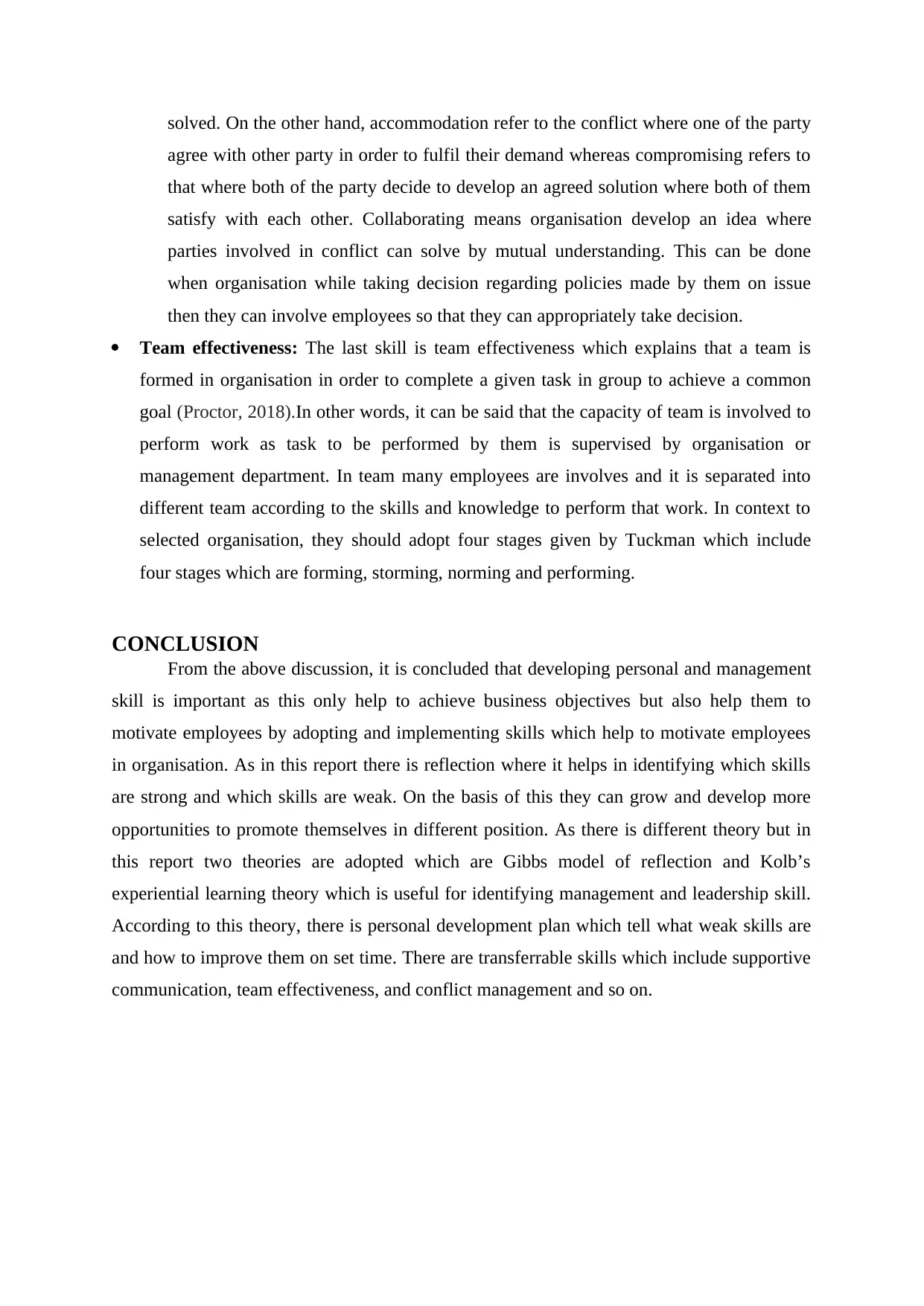
solved. On the other hand, accommodation refer to the conflict where one of the party
agree with other party in order to fulfil their demand whereas compromising refers to
that where both of the party decide to develop an agreed solution where both of them
satisfy with each other. Collaborating means organisation develop an idea where
parties involved in conflict can solve by mutual understanding. This can be done
when organisation while taking decision regarding policies made by them on issue
then they can involve employees so that they can appropriately take decision.
Team effectiveness: The last skill is team effectiveness which explains that a team is
formed in organisation in order to complete a given task in group to achieve a common
goal (Proctor, 2018).In other words, it can be said that the capacity of team is involved to
perform work as task to be performed by them is supervised by organisation or
management department. In team many employees are involves and it is separated into
different team according to the skills and knowledge to perform that work. In context to
selected organisation, they should adopt four stages given by Tuckman which include
four stages which are forming, storming, norming and performing.
CONCLUSION
From the above discussion, it is concluded that developing personal and management
skill is important as this only help to achieve business objectives but also help them to
motivate employees by adopting and implementing skills which help to motivate employees
in organisation. As in this report there is reflection where it helps in identifying which skills
are strong and which skills are weak. On the basis of this they can grow and develop more
opportunities to promote themselves in different position. As there is different theory but in
this report two theories are adopted which are Gibbs model of reflection and Kolb’s
experiential learning theory which is useful for identifying management and leadership skill.
According to this theory, there is personal development plan which tell what weak skills are
and how to improve them on set time. There are transferrable skills which include supportive
communication, team effectiveness, and conflict management and so on.
agree with other party in order to fulfil their demand whereas compromising refers to
that where both of the party decide to develop an agreed solution where both of them
satisfy with each other. Collaborating means organisation develop an idea where
parties involved in conflict can solve by mutual understanding. This can be done
when organisation while taking decision regarding policies made by them on issue
then they can involve employees so that they can appropriately take decision.
Team effectiveness: The last skill is team effectiveness which explains that a team is
formed in organisation in order to complete a given task in group to achieve a common
goal (Proctor, 2018).In other words, it can be said that the capacity of team is involved to
perform work as task to be performed by them is supervised by organisation or
management department. In team many employees are involves and it is separated into
different team according to the skills and knowledge to perform that work. In context to
selected organisation, they should adopt four stages given by Tuckman which include
four stages which are forming, storming, norming and performing.
CONCLUSION
From the above discussion, it is concluded that developing personal and management
skill is important as this only help to achieve business objectives but also help them to
motivate employees by adopting and implementing skills which help to motivate employees
in organisation. As in this report there is reflection where it helps in identifying which skills
are strong and which skills are weak. On the basis of this they can grow and develop more
opportunities to promote themselves in different position. As there is different theory but in
this report two theories are adopted which are Gibbs model of reflection and Kolb’s
experiential learning theory which is useful for identifying management and leadership skill.
According to this theory, there is personal development plan which tell what weak skills are
and how to improve them on set time. There are transferrable skills which include supportive
communication, team effectiveness, and conflict management and so on.
⊘ This is a preview!⊘
Do you want full access?
Subscribe today to unlock all pages.

Trusted by 1+ million students worldwide
1 out of 13
Related Documents
Your All-in-One AI-Powered Toolkit for Academic Success.
+13062052269
info@desklib.com
Available 24*7 on WhatsApp / Email
![[object Object]](/_next/static/media/star-bottom.7253800d.svg)
Unlock your academic potential
Copyright © 2020–2026 A2Z Services. All Rights Reserved. Developed and managed by ZUCOL.




